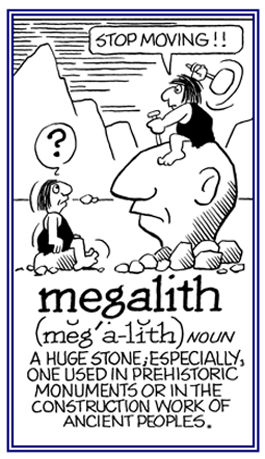mega-, meg-
(Greek: large, great, big, powerful)
When measuring in the metric [decimal] system, it means a million [U.S.] or millionfold [U.K.]: 106 [1 000 000]. The metric symbol for mega- is M.
megaelectronvoltcurie, megaelectronvolt-curie
A unit of radioactive power, equal to the power generated by one curie emitting an average energy of 106 electronvolts per disintegration.
megaerg
megaesophagus
Failure of the esophagogastric sphincter to relax with swallowing, as a result of the degeneration of the ganglion cells in the wall of the organ.
The thoracic esophagus also loses its normal peristaltic activity and becomes dilated. Also called, cardiospasm.
Specifically, failure of the esophagogastric sphincter to relax when swallowing, because of the degeneration of ganglion cells in the wall of the organ.
1. Large or relatively large animals, as of a particular region or period, considered as a group.
2. Creatures that had the dual virtues of being dramatically large and coexistent with prehistoric humans who hunted mammoths and mastodons.
2. Creatures that had the dual virtues of being dramatically large and coexistent with prehistoric humans who hunted mammoths and mastodons.
American megafauna once included: mammoths, camels, giant short-faced bears, giant armadillos, stag moose, glyptodonts (resembling giant armadillos), saber-toothed cats, dire wolves (larger and having more massive skulls than modern wolves), giant ground sloths, and horses, among others.
A zoogeographical area consisting of the Palaearctic, Nearctic, Ethopian, and Oriental regions; Arcotogaea: There are three Megagaea areas in the world, including Africa, Asia, specific islands southeast of Asia, and North America's polar and temperate zones.
megagauss
megagnathia
An enlargement or elongation of the jaw.
megagram
A unit of mass equal to 1,000,000 grams. Symbol: Mg.
megahertz
megajoule
A giant sensory-nerve ending in Mollusca, such as oysters, snails, squids, and octopi and thought to be photosensitive: Dr. Marshland was conducting comparative studies of the megalaesthetes of both deep sea and tidal pond dwellers.
Megalansaurus
A reptile, not a dinosaur, from the Late Triassic period.
megalencephaly
A condition in which there is an abnormally large, heavy, and usually malfunctioning brain. By definition, the brain weight is greater than average for the age and sex of the infant or child. Head enlargement may be evident at birth or the head may become abnormally large in the early years of life; also called macrencephaly.
Outdated, a very severe pain: Judy suffered from a case of megalgia when she fell from her horse and broke her arm.
A structure or arrangement of large stone slabs; especially, those found in northern and western Europe from the Mesolithic period: Stonehenge in Southern England is one example of megaliths.

© ALL rights are reserved.
Go to this Word A Day Revisited Index



